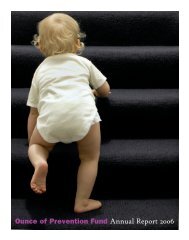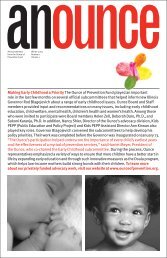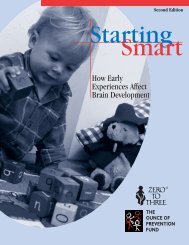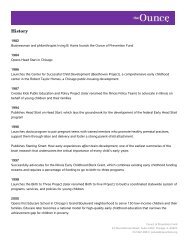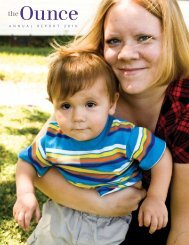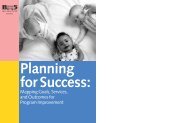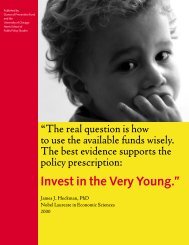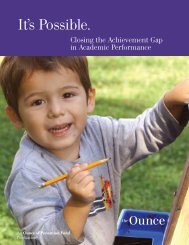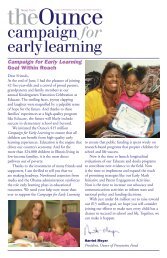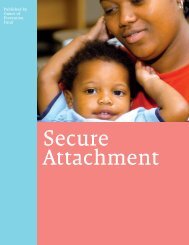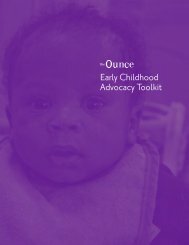The Ounce of Prevention 2012 Annual Report
The Ounce of Prevention 2012 Annual Report
The Ounce of Prevention 2012 Annual Report
You also want an ePaper? Increase the reach of your titles
YUMPU automatically turns print PDFs into web optimized ePapers that Google loves.
10<br />
It’s not enough to advocate successfully for new federal<br />
funding streams and policies in support <strong>of</strong> quality<br />
early childhood experiences. We must also ensure that<br />
those new dollars reap promised results that can drive<br />
future investments in a sustained funding stream.<br />
11<br />
IMPROVING QUALITY FOR ALL<br />
YOUNG CHILDREN<br />
Capitalizing on a new federal funding opportunity through the Early Learning<br />
Challenge, the First Five Years Fund partnered with the BUILD Initiative<br />
to highlight the need for increased investment in quality early learning<br />
programs. This partnership powerfully and irrefutably demonstrated that<br />
quality services are needed throughout the country, that state lawmakers<br />
on both sides <strong>of</strong> the political aisle are committed to creating those quality<br />
services, and that states have realistic, measurable plans for how they can<br />
use federal funding to improve school readiness for at-risk children.<br />
*Original funding for FFYF came from the Buffett Early<br />
Childhood Fund, Bill & Melinda Gates Foundation, the Irving<br />
Harris Foundation, George Kaiser Family Foundation and<br />
Pritzker Children’s Initiative.<br />
**Additional funding for the collaborative was provided by<br />
the Pritzker Children’s Initiative, Buffett Early Childhood Fund,<br />
Bill & Melinda Gates Foundation, David and Lucile Packard<br />
Foundation, Annie E. Casey Foundation, Robert R. McCormick<br />
Foundation, Kresge Foundation, <strong>The</strong> Heinz Endowments,<br />
William Penn Foundation, Rauch Foundation, George Gund<br />
Foundation and the Early Childhood Funders’ Collaborative.<br />
This year the First Five Years Fund (FFYF),<br />
which was created by the <strong>Ounce</strong> in partnership<br />
with five national philanthropies* in 2007,<br />
helped to achieve one <strong>of</strong> the most significant<br />
federal policy developments in recent memory:<br />
the launch <strong>of</strong> the Early Learning Challenge<br />
(ELC), a competitive grant for states to improve<br />
the quality and effectiveness <strong>of</strong> their early<br />
learning systems infrastructure. <strong>The</strong> ELC<br />
provides $500 million in federal funding and<br />
the opportunity to build the systems and<br />
supports necessary to better meet existing need<br />
for quality early learning programs—and to<br />
ensure those programs are sustained.<br />
With leadership and anchor support from the<br />
Irving Harris Foundation,** FFYF formed an<br />
innovative partnership with the BUILD Initiative,<br />
a long-time ally with expertise in state systemsbuilding<br />
approaches. <strong>The</strong> partnership was called<br />
the Early Learning Challenge Collaborative, and its<br />
goals were to cultivate interest among governors<br />
in applying for ELC funding, strengthen states’<br />
applications through ongoing support from<br />
experts and track the progress and success <strong>of</strong><br />
winning states so that FFYF and its partners could<br />
advocate on Capitol Hill for continued funding.<br />
<strong>The</strong> collaborative convened state teams, early<br />
learning experts and education reform leaders<br />
for a two-day working session in September<br />
2011. That October, 37 states submitted ELC<br />
applications. Ultimately, nine states—California,<br />
Delaware, Maryland, Massachusetts, Minnesota,<br />
North Carolina, Ohio, Rhode Island and<br />
Washington—received Phase One grants, though<br />
$2 billion worth <strong>of</strong> demand clearly outstripped<br />
available grant funding. That demand made<br />
a clear, compelling case for ongoing federal<br />
investment in building early learning systems.<br />
Leveraging existing and new partnerships, FFYF<br />
ultimately achieved another dramatic victory:<br />
securing an additional $133 million to<br />
support early learning systems-building in five<br />
other states in fall <strong>2012</strong>—Colorado, New Mexico,<br />
Oregon, Wisconsin and Illinois. <strong>Ounce</strong> staff<br />
partnered with the state <strong>of</strong> Illinois to<br />
apply for ELC funds. Illinois is now eligible<br />
for a $35 million grant to implement new<br />
school-readiness assessments, create a quality<br />
rating system for birth-to-five programs<br />
and build infrastructures to identify and link<br />
high-needs children to services.<br />
“This new partnership allowed us to capitalize<br />
on what some have called a ‘once-in-threegenerations<br />
opportunity,’” said Phyllis<br />
Glink, executive director, the Irving Harris<br />
Foundation. “We were able to provide states<br />
and the field with valuable resources that<br />
were made stronger because <strong>of</strong> the<br />
collaborative. <strong>The</strong> lessons learned and the<br />
states’ successes will provide a body <strong>of</strong><br />
evidence to make the case for continued<br />
investments in quality early learning systems.”<br />
<strong>Ounce</strong> <strong>of</strong> <strong>Prevention</strong> Fund: <strong>2012</strong> <strong>Annual</strong> <strong>Report</strong>



